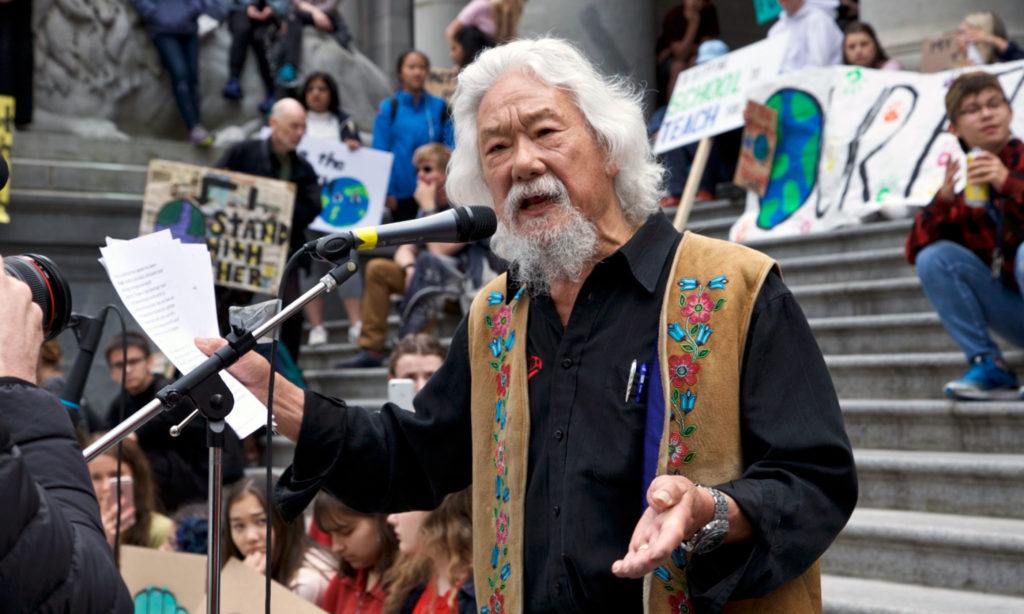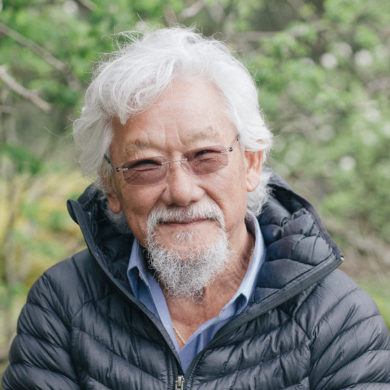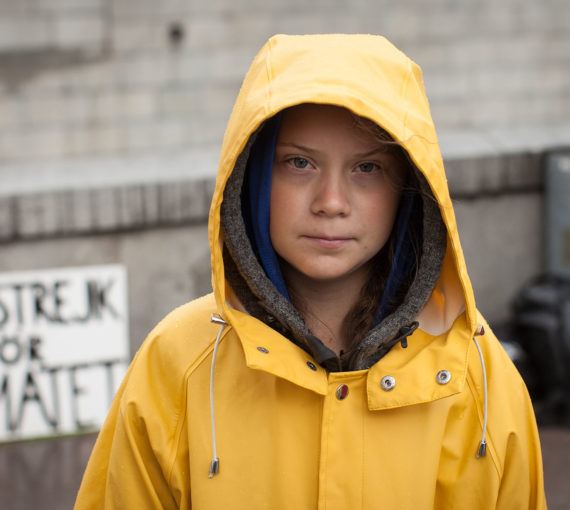
(Photo: Janice Williams)
Read the full text of the speech David Suzuki gave to student climate strikers in Vancouver on May 3, 2019.
I begin by recognizing that we are on the traditional, unceded territory of the Coast Salish people — Musqueam, Squamish and Tsleil-Waututh — and I thank you for caring for these lands and waters for thousands of years. It has been Indigenous people here and in many parts of the world who have taught me all about our responsibility to care for nature so she can continue to be abundant and generous for us. We all have to thank you for holding on to your values and culture and to be willing to share your knowledge with us.
And thank you, youth of Vancouver, for inviting me to be part of your event and for the privilege of sharing a few thoughts with you. I am here today to speak as an elder, with no hidden agenda or vested interest in the status quo, and with a life of experience to give credence to my words.
I also speak as a father and grandfather. Every parent hopes to leave their children better off than he or she was growing up, but my generation and the boomers that followed were too busy celebrating the recovery from the Great Depression of the 1930s and then victory in World War II and tried to keep the good times going through consumerism and economic growth.
We didn’t think about responsibility or long-term consequences of the way we were living; we just partied as if there was no tomorrow. Well, tomorrow has come. And we know that in the name of progress, we have mortgaged your futures by using up your rightful legacy:
- land once covered in vast forests, wetlands and grasslands occupied by animals in great abundance and diversity,
- oceans that were free of plastic and rich in biodiversity and fresh water that we could drink without treatment,
- an atmosphere free of toxic chemicals and excess greenhouse gases.
As a member of my generation, I thank you for leaving school today and gathering here to bring us to our senses in the realization that short-term profit, election to office and economic growth can no longer be society’s highest priorities. Those priorities must be your future and the state of the world that you will inherit.
I speak as well as a scientist. I returned to Canada after studying science in the United States for eight years and was shocked at how poorly Canadians understood the important role of science in describing the world and anticipating its consequences when applied by industry, medicine and the military. So I was diverted into a career in the media trying to demystify science.
How can citizens have a say in how science and technology will be used if they aren’t scientifically literate? Citizens must be able to appreciate, assess and understand observations, insights and discoveries in science. Not only is science driving genetic engineering, artificial intelligence, space exploration, the digital revolution and nanotechnology, scientists also have important things to tell us about the condition of the planet.
The great survival trait of our species has been foresight, the ability to look ahead, anticipate and avoid danger and recognize and exploit opportunity.
The great survival trait of our species has been foresight, the ability to look ahead, anticipate and avoid danger and recognize and exploit opportunity. That gave us a huge advantage over all other species and brought us to the point of dominance over the entire planet. Now, we have all of the increased ability to look ahead that scientists and supercomputers provide. And for over half a century, some of the leading scientists of the world have been warning that we are on a dangerous path.
In 1992, a remarkable document called “World Scientists’ Warning to Humanity” was signed by top scientists from 71 countries and included more than half of all Nobel prizewinners. Here’s how it began:
“Human beings and the natural world are on a collision course. Human activities inflict harsh and often irreversible damage on the environment and on critical resources. If not checked, many of our current practices put at serious risk the future that we wish for human society and the plant and animal kingdoms, and may so alter the living world that it will be unable to sustain life in the manner that we know. Fundamental changes are urgent if we are to avoid the collision our present course will bring about.”
The document then lists the areas of collision — the atmosphere, water resources, oceans, soil, forests, species extinction and population — and then the warning becomes even more urgent:
“No more than one or a few decades remain before the chance to avert the threats we now confront will be lost and the prospects for humanity immeasurably diminished…. A great change in our stewardship of the earth and life on it is required, if vast human misery is to be avoided and our global home on this planet is not to be irretrievably mutilated.”
It then proposed the five most necessary things to do:
- Stop environmentally damaging practices in order to protect the integrity of Earth’s systems,
- Manage our use of resources more effectively,
- Stabilize human population,
- Eliminate poverty,
- Ensure sexual equality and guarantee women control over their own reproductive decisions.
That was 1992! Think of what could have happened if we had listened and acted on the urgent call by top scientists in the world. But we didn’t. Twenty-five years later in 2017, 16,000 scientists signed a second warning, informing us that all but one of the problems of 1992 are worse (the only exception was the thinning ozone layer) and new issues are emerging.
Why are we no longer acting in our own self-interest by taking foresight seriously?
Why are we no longer acting in our own self-interest by taking foresight seriously? We have become so puffed up with how clever we are and our sense of self-importance that we think our creations are more important than the natural world. We draw lines around property, cities, provinces and countries and try to manage nature within those boundaries. We fight and kill to protect those borders. I wouldn’t mind if Albertans were to dig up and burn every bit of tar sands oil and store a toxic brew in huge tailings ponds — as long as the greenhouse gases and everything else that results stayed within Alberta! That’s not the way the real world works. Nature doesn’t care about human borders.
We create legal systems built around human rights and private property, but where are the rights of rivers to run free, of air to flow around the earth, of other species to live and flourish in their part of the planet?
We have created an economic system built around human creativity and productiveness while ignoring such things as plants absorbing and storing carbon dioxide while giving back oxygen, creation of soil, filtration of water percolating through earth and recycling the carcasses of plants and animals throughout the web of life. All the things that nature does to keep the planet healthy and habitable for animals like us are dismissed as externalities — unimportant compared to what humans can do, create and produce.
Stephen Harper was Prime Minister of Canada for almost a decade, and his response to the demand to minimize the effect of climate change was that was “crazy economics” and trying to reduce emissions would ”destroy the economy.” In other words, the economy was more important than the atmosphere that gives us air to breathe, weather, climate and the seasons. Harper’s legacy continues as we see Premiers Kenney of Alberta, Ford of Ontario and Moe of Saskatchewan fighting Prime Minister Trudeau’s carbon tax but never mentioning climate change.
And as we’ve seen with the recent scandal over SNC-Lavalin, corporations, driven only by the need to make money — the more and faster the better — hold governments hostage by the threat of cutting jobs or moving somewhere else. The fossil fuel industry, informed by Exxon’s own scientists, have known for more than 40 years that burning fossil fuels is causing dangerous global warming yet has spent hundreds of millions to convince the public the threat is not real or proven in order to reap hundreds of billions.
In a democracy, civil society is supposed to elect people to act on our behalf and lead us into a brighter future, but the trouble with politicians is politics.
In a democracy, civil society is supposed to elect people to act on our behalf and lead us into a brighter future, but the trouble with politicians is politics. It costs money to run for office, and massive amounts come from corporations. Once elected, politicians serve those who supported them, so the corporate agenda becomes the government’s priority. Once elected, every politician’s most urgent goal is re-election. But warming of Earth, acidification of oceans, melting of ice sheets and species extinction, while explosively rapid in geological terms, are too slow in election cycles to take precedence over housing, jobs, GDP or corporate profit.
And so the changing state of the world and the diminishing prospects for your future give way to the next election, party unity, corporate needs and the economy. Greta Thunberg and you here today and the millions of young people around the world are calling out our so-called leaders, ignoring their patronizing reassurances and taking what scientists say seriously. The planet is being warmed by emissions caused by human use of fossil fuels. The repercussions of such rapid change reverberate through the air, oceans and forests with catastrophic effects. A rise beyond 1.5 C since pre-industrial times by 2100 will create climate chaos. According to the special report of the Intergovernmental Panel on Climate Change released in October last year, we are on a trajectory far beyond the 1.5 C target but can stay within it if we cut emissions by 45 per cent by 2030 and 100 per cent by 2050. If we fail to meet those targets, and they are draconian because of the years of inaction, the underpinnings of civilization will collapse, beginning with food and the economy.
Youth are absolutely right to leave classes and demand action, because it’s your entire future that is at stake. Every parent and grandparent and teacher who cares about youth has a responsibility to support you in your call.
Youth are absolutely right to leave classes and demand action, because it’s your entire future that is at stake. Every parent and grandparent and teacher who cares about youth has a responsibility to support you in your call for our so-called leaders to make a genuine commitment to take action to rapidly reduce our use of fossil fuels.
In science fiction films, when aliens from outer space come to Earth and begin to kill people indiscriminately, Russian, Chinese and American leaders join together to fight a common threat. When the newly elected premier of Alberta sets up his war room, I will say, “A war room is actually what we need. We are in a battle for the future of youth, and we are all united in the war against climate change. We want and will support Alberta to remain the energy powerhouse of the country, to show leadership and find new opportunities in clean, renewable sources, to transfer the skills learned in the exploitation of fossil fuels to sources from wind, solar, geothermal and hydrogen and find ways to store and conserve energy.”
This is the all-time challenge for our species. Will we show the wisdom to act with the guidance of science? Will we have the compassion to help those most impacted by the unavoidable warming already happening? Will we have the intelligence to find new opportunities in transforming our sources of energy and the way we live? Do we love our children above all else and are we willing to do anything for their sake?
Thank you, young people, for making us ask these questions because I believe the answer is “yes” to all of them. We just have to find the will and make the commitment to do what we have to do.
Support students’ call for an emergency climate justice plan




